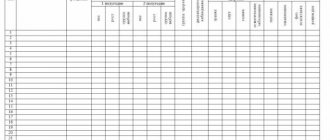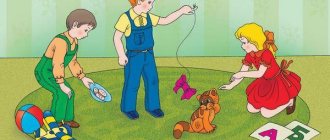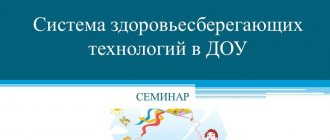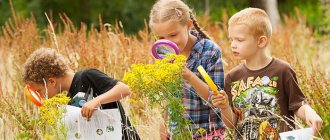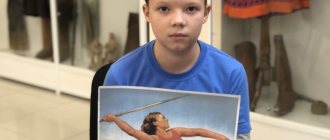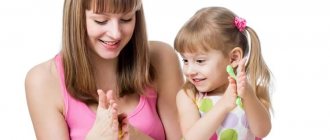Organization of active recreation for children in preschool educational institutions. Health days and holidays
Bibliographic description:
Kukushkina, M. A. Organization of active recreation for children in preschool educational institutions. Health days and holidays / M. A. Kukushkina. — Text: direct // Education and upbringing. — 2021. — No. 1 (16). — P. 18-20. — URL: https://moluch.ru/th/4/archive/81/3085/ (access date: 12/29/2021).
The article reveals the content of the educational cycle “health week in kindergarten” from the point of view of organizing physical education and health activities. The author gives recommendations for conducting traditional recreational activities, and also introduces new forms of organizing active recreation for children.
Key words : health days, health week, preschool education, holidays in kindergarten, active recreation, organization of physical education and recreational activities.
“Take care of your health from a young age” - this motto reflects the need to strengthen the health of a child from the first days of his life. Raising children healthy, strong, and emotional is the goal of every preschool institution.
One of the main tasks of physical education of preschool children is to improve the child’s body, increase its performance using a variety of forms and means of working with children. There are different forms of organizing physical education. Physical education instructors most often use physical education holidays and leisure time in their work; as well as health days and holidays.
It has long been known that the most effective form of organizing active recreation in a preschool institution is the introduction of health days or weeks. As a rule, in kindergarten it is customary to spend a health week in each season of the year. All classes are canceled on these days. The daily routine is filled with physical activity of children, sports games and exercises, musical entertainment, work in nature, artistic creativity, hiking, parents are invited. I would like to note that the health week is not the work of the physical education instructor exclusively; the entire kindergarten staff provides a complex of health-improving, educational and educational activities, the basis of which is motor activity.
Each day of the health week begins with a morning reception for children, which takes place in an entertaining, comic form. Children and parents are asked to complete various fun tasks before they get into the group: this could be an “obstacle course,” asking riddles about sports, and so on.
During health week, you can use a non-standard form of morning exercises, “Family exercises.” During this period, mothers and fathers, older brothers and sisters, as well as sports grandparents are invited. This “Family exercise” significantly improves the mood and strengthens the nervous system of children, charges them with vigor and positive emotions for the whole day; those children whose relatives try themselves as a physical education instructor are especially proud and happy. I would like to note the importance of this work from the point of view of establishing a trusting social partnership with the parents of the students. Parents begin to understand and accept the rules of the kindergarten more, trust teachers and specialists, and teachers, in turn, begin to count on the support of the families of their students. You can introduce an optional element into “Family Exercise” - a game with adults. In this case, the children themselves choose the game; they love to compete with moms and dads in speed and dexterity.
During the “Health” week, it is recommended to carry out hardening not in the form usual for children, but with the involvement of fairy-tale characters. These days, younger preschoolers are given certain hygienic knowledge in a theatrical form, and then the acquired skills are reinforced in the form of a game.
And older preschool children are asked to act as teachers themselves, asked to tell and show fairy-tale characters how to temper themselves with cool water and perform rubdowns.
Gymnastics of awakening together with a fairy-tale hero helps the child’s body not only wake up and increase muscle tone, but also improves mood. Children gradually move from sleep to wakefulness.
On health days and holidays, it is necessary to attach great importance to the physical activity of children on the street. These days, the physical education instructor, together with teachers, plans and conducts themed walks with a health and sports focus. The use of gaming pedagogical technologies allows you to fill a walk on the street with motor activity as effectively as possible. In younger groups, this is most often physical education activity involving outdoor games with an obligatory guest: a Fox, a Dog or a Bunny. Children play with the characters with great pleasure, without noticing that at the same time they are performing complex motor exercises. Children of senior preschool age are also offered non-standard outdoor activities during health weeks. More playful exercises and fun activities are selected for them in accordance with the central theme of the week. So, for example, in November, when the central theme is the Motherland, a hero from Russian folk tales (Ivan Tsarevich or Petrushka) comes to the children and competes with the children in performing traditional Russian games. In winter, as a rule, children are introduced to winter sports or the Winter Olympics are held.
But the most beloved and long-awaited events for children that take place during health week are, of course, physical education holidays and leisure activities in the afternoon. At the same time, children get the opportunity to show greater activity, independence and initiative in actions.
It is necessary to actively involve the families of pupils in physical culture and leisure activities. It is recommended to hold joint runs with parents, sports festivals, competitions, hiking trips, and organize photo exhibitions “My Sports Family.”
A traditional event for the kindergarten during health week is the cycle of sports festivals “Dad, Mom, I - a sports family!” Parents must be informed in advance about the program and time of upcoming events so that they can also actively participate in their preparation. Typically, families of pupils show great interest in issues related to the physical development and health of children. The family largely determines children’s attitude towards physical education, their interest in sports, activity and initiative. Children are especially susceptible to beliefs, the positive example of their father, mother, and family lifestyle.
One of the new forms of organizing active recreation can be the Festival of the All-Russian Physical Education Sports Complex GTO. Not only children, but also kindergarten teachers can take part and pass the standards in such a Festival. Experience shows that children are better involved in physical education and sports activities when their older friends - educators and specialists - train next to them shoulder to shoulder and fulfill the standards.
This motivates children very much, and even the seemingly least athletic children become little athletes in their persistence in achieving results. And for teachers, this is also a great motivation to keep themselves in sports shape.
A great time to organize active recreation for children in kindergarten is the holidays. For general education groups, vacations are organized in winter in the second week of January. And in the summer, from June 1 to August 31. And for children attending compensatory groups, additional holidays are introduced: in the first week of November and the first week of April. Their goal is to reduce the intellectual load of children, provide active recreation for children, promote healing and strengthening of the body in unity with the emotional and positive state of mind of preschoolers. During the holidays, activities related to the mental activity of children are canceled. Along with this, all organizational forms of physical education are widely used (morning exercises, daily physical education classes, etc.) and the time children spend in the fresh air is significantly increased.
I would also like to say about the summer period, because summer is an amazing and fertile time for organizing active recreation for children. This is due, first of all, to the fact that in the summer the number of indoor activities decreases, the daily routine is saturated with physical activity carried out in the open air, and it becomes possible to more effectively use the healing power of nature in the physical education system.
Active recreation activities (physical education holidays and leisure, health days) in kindergartens are planned by the creative team twice a year, when the annual work plan for the kindergarten and the plan for the summer health campaign are prepared.
Knowing that the diverse physical activity of children helps to improve health, increase the functional and adaptive capabilities of the body, and improve motor skills, it is important to remember that the main task of a physical education teacher in preschool childhood is to teach the child to experience the joy of movement.
Literature:
- Kopukhova N. N., Ryzhkova L. A., Samodurova M. M. Physical education teacher in preschool institutions. M.: Publishing house, 2002. pp. 198–199
- Runova M. A. Motor activity of a child in kindergarten. - M.: Publishing House, 2000. 12 p.
- Mashchenko M. V., Shishkina V. A. Physical education of preschool children. - Mn.: Urajai, 2000. 275 p.
- Shebeko V.N., Ovsyankin V.A., Karmanova L.V. Physical education! — Mn.: “Enlightenment”, 1997. 125 p.
- Mashchenko M.V., Shishkina V.A. What kind of physical education does a preschooler need? - Mn.: NM Center, 1998. 136 p.
Key terms
(generated automatically)
: health week, kindergarten, child, active recreation, health day, physical education, active recreation for children, physical education, form of organization, physical activity.
project “Active weekend for the whole family”
These seemingly useless objects can easily be turned into fun toys and aids for performing various exercises.
Children in physical education classes and independent activities should, first of all, be interested.
And here equipment, especially non-standard equipment, plays a big role.
Having set one of the goals of creating new non-standard equipment that helps the full physical development of children, the following tasks are solved:
— Ensure high motor activity, improving children’s movements and their physical qualities.
— Develop creative imagination, desire for activity, independence.
— To develop children’s interest in the process of movements using non-standard equipment.
- Cultivate friendly relationships between children, the desire to come to the aid of each other.
Along with conventional equipment, physical education areas should have non-standard equipment. It must comply with the requirements of the “Instructions for the Protection of the Life and Health of Children,” be easily sanitized, and ensure the safety of children during games and activities. The use of non-standard aids adds variety to physical activities and allows for wider use of familiar exercises.
Non-standard equipment combines physical education with play, which creates conditions for the most complete self-expression of the child in physical activity.
Effectively using physical education equipment means ensuring the optimal duration of its use throughout the day in different forms and types of activities in order to achieve children’s mastery of all types of physical exercises, their motor creativity at the level of age and individual capabilities. One of the methods for increasing the efficiency of using physical education equipment is novelty, which is created by introducing new non-standard equipment, changing portable equipment, and various aids into unique complexes (obstacle courses, houses, fences, barriers). Children of all ages perform exercises with non-standard physical education equipment with great pleasure and achieve good results.
Appendix 3
Weekend route
(series of instructions for parents)
Target:
Involve parents in joint active activities in matters of physical education.
Tasks:
Ensure the physical and emotional development of the child in the preschool and family.
To form an active position of parents in raising children, to increase their degree of participation in the pedagogical process.
Educate parents in order to improve psychological and pedagogical culture;
